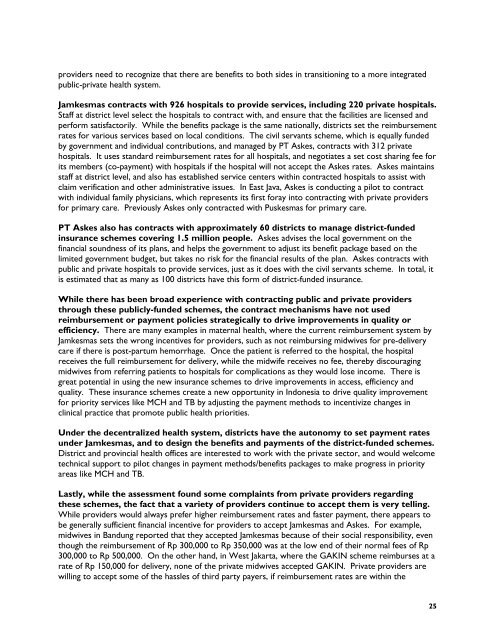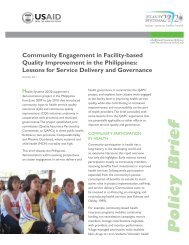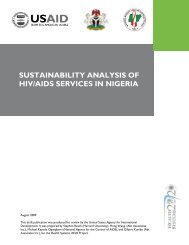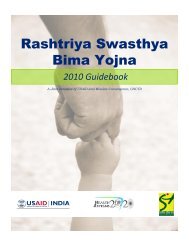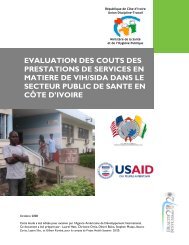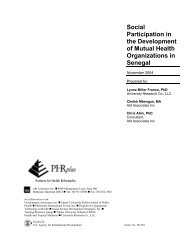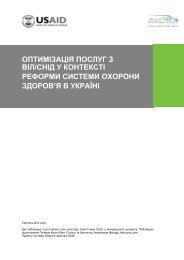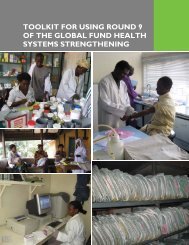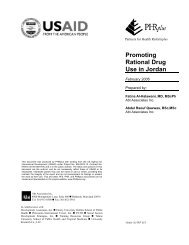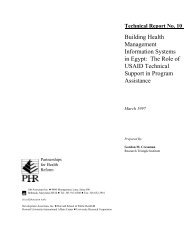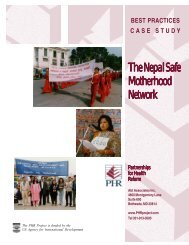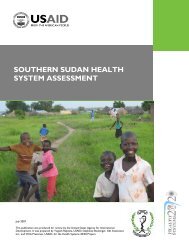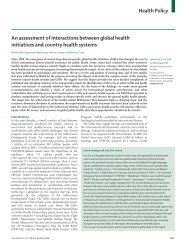PRIVATE SECTOR HEALTH CARE IN INDONESIA - Health Systems ...
PRIVATE SECTOR HEALTH CARE IN INDONESIA - Health Systems ...
PRIVATE SECTOR HEALTH CARE IN INDONESIA - Health Systems ...
- No tags were found...
You also want an ePaper? Increase the reach of your titles
YUMPU automatically turns print PDFs into web optimized ePapers that Google loves.
providers need to recognize that there are benefits to both sides in transitioning to a more integratedpublic-private health system.Jamkesmas contracts with 926 hospitals to provide services, including 220 private hospitals.Staff at district level select the hospitals to contract with, and ensure that the facilities are licensed andperform satisfactorily. While the benefits package is the same nationally, districts set the reimbursementrates for various services based on local conditions. The civil servants scheme, which is equally fundedby government and individual contributions, and managed by PT Askes, contracts with 312 privatehospitals. It uses standard reimbursement rates for all hospitals, and negotiates a set cost sharing fee forits members (co-payment) with hospitals if the hospital will not accept the Askes rates. Askes maintainsstaff at district level, and also has established service centers within contracted hospitals to assist withclaim verification and other administrative issues. In East Java, Askes is conducting a pilot to contractwith individual family physicians, which represents its first foray into contracting with private providersfor primary care. Previously Askes only contracted with Puskesmas for primary care.PT Askes also has contracts with approximately 60 districts to manage district-fundedinsurance schemes covering 1.5 million people. Askes advises the local government on thefinancial soundness of its plans, and helps the government to adjust its benefit package based on thelimited government budget, but takes no risk for the financial results of the plan. Askes contracts withpublic and private hospitals to provide services, just as it does with the civil servants scheme. In total, itis estimated that as many as 100 districts have this form of district-funded insurance.While there has been broad experience with contracting public and private providersthrough these publicly-funded schemes, the contract mechanisms have not usedreimbursement or payment policies strategically to drive improvements in quality orefficiency. There are many examples in maternal health, where the current reimbursement system byJamkesmas sets the wrong incentives for providers, such as not reimbursing midwives for pre-deliverycare if there is post-partum hemorrhage. Once the patient is referred to the hospital, the hospitalreceives the full reimbursement for delivery, while the midwife receives no fee, thereby discouragingmidwives from referring patients to hospitals for complications as they would lose income. There isgreat potential in using the new insurance schemes to drive improvements in access, efficiency andquality. These insurance schemes create a new opportunity in Indonesia to drive quality improvementfor priority services like MCH and TB by adjusting the payment methods to incentivize changes inclinical practice that promote public health priorities.Under the decentralized health system, districts have the autonomy to set payment ratesunder Jamkesmas, and to design the benefits and payments of the district-funded schemes.District and provincial health offices are interested to work with the private sector, and would welcometechnical support to pilot changes in payment methods/benefits packages to make progress in priorityareas like MCH and TB.Lastly, while the assessment found some complaints from private providers regardingthese schemes, the fact that a variety of providers continue to accept them is very telling.While providers would always prefer higher reimbursement rates and faster payment, there appears tobe generally sufficient financial incentive for providers to accept Jamkesmas and Askes. For example,midwives in Bandung reported that they accepted Jamkesmas because of their social responsibility, eventhough the reimbursement of Rp 300,000 to Rp 350,000 was at the low end of their normal fees of Rp300,000 to Rp 500,000. On the other hand, in West Jakarta, where the GAK<strong>IN</strong> scheme reimburses at arate of Rp 150,000 for delivery, none of the private midwives accepted GAK<strong>IN</strong>. Private providers arewilling to accept some of the hassles of third party payers, if reimbursement rates are within the25


